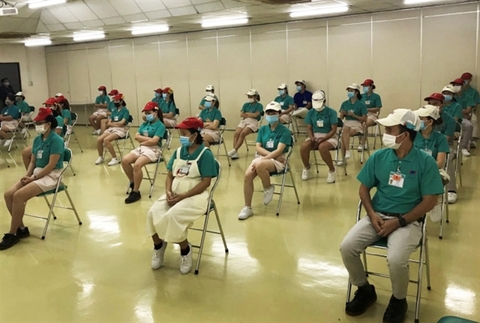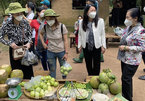 |
|
Workers at Furukawa Automotive Parts Vietnam Inc. Co., Ltd are tested for Covid-19 in June.
|
Enterprises applying the "3 on-site" model, which involves eating, sleeping and working without leaving, have been working with 30 per cent of their total workers.
If they want to increase that number to 50 per cent of the workforce, 30 per cent of their workers who have received at least one vaccine dose must eat, sleep and stay at the factory. The remaining 20 per cent must be fully vaccinated (two doses) and be living in green (low-risk) areas, where they can return home after work.
If employees travel by personal vehicle, they must follow the "one route, two destinations" model (workers travel between their accommodation and the factory with no stops on the way, on a set route).
If travelling by factory shuttle, epidemic prevention rules must be followed, such as always wearing a mask, keeping a distance of at least 2m from each other, and having a driver with a negative test result for COVID-19 within the previous 72 hours.
Dao Quoc Cuong, administrative director of Juki Viet Nam Co., Ltd in District 7 Tan Thuan Export Processing Zone, said that he was pleased that the city allowed a higher number of workers in production, but after carefully studying the requirements, he found that it would be very difficult to apply.
He said that green areas could change to high-risk areas because the city is undergoing mass COVID-19 testing until September 30. The factory would then lose workers, he added.
In addition, the outbreak in the community remained complicated, but the city required the factory to have no positive COVID-19 cases for a period of seven days, which is nearly impossible, he said.
Hoang Xuan Thai, chairman of the Union of Furukawa Automotive Parts Vietnam Inc. Co., Ltd, said that few businesses would be able to meet the requirement of not having a COVID-19 case for seven days.
His factory had more than 7,000 employees, so the probability of infection could be higher than in factories with 70 or 700 employees.
"The city needs to issue a certain rate so that factories can meet it. It's not feasible to require no positive cases."
Nguyen Van Be, chairman of the HCM City Export Processing Zone and Industrial Park Authority Business Association (HBA), said the city wanted to control the epidemic at the safest level but it also needed to consider the feasibility of epidemic prevention regulations and the ability of businesses.
HCM City businesses eager to resume, but regulation, worker availability worries linger
HCM City businesses are eager and preparing to reopen after months of closure due to stringent social distancing orders, but continue to face challenges from tough regulations and staff shortages.
HCM City, the country’s COVID-19 epicentre, is focusing on gradually reopening while also ensuring safety, and its strict preventive measures are expected to be relaxed after September 30 if the outbreak is under control.
Le Duy Toan, director of Duy Anh Foods Import Export Co. Ltd, said his company had been closed since mid-July and had to postpone export orders.
Businesses are struggling after having to temporarily close down or meet the expenses of employees’ accommodation, food and COVID tests while also limiting production, he said.
“If the city does not reopen, the situation will worsen in the coming months,” he told Viet Nam News.
“I would like nothing more than for my business to be able to resume production after September 30.”
Pham Thi Kim Hang, founder of environment - friendly products supplier Limart – Zero Waste, told Viet Nam News her shop had to close down but still pay staff wages.
It also lost customers since it was unable to deliver online orders, though recently it had been able to resume deliveries after the city eased some travel restrictions.
Dr Tran Hoang Ngan, director of the HCM City Institute for Research and Development, said the city could not enforce strict social distancing orders forever and would have instead to adapt to the pandemic.
Tran Viet Anh, chairman of Thu Duc City Business Association, said especially export businesses in key fields such as textile and garment and electronics need to resume operations quickly to not lose customers to foreign competitors.
Opportunities for recovery
Trinh Tien Dung, general director of Dai Dung Metallic Manufacture Construction and Trade Corporation, said there were a lot of opportunities for businesses returning to the market, but they would have to change their management and operations.
His company, which incurred heavy losses last year, had been investing in new sectors and focusing on digital transformation and risk management to continue doing business with overseas customers, enabling it to continue operations despite the COVID difficulties, he said.
Hang’s business is also focusing on launching applications as part of digital transformation to improve its online activities so that it can operate efficiently amid the pandemic.
Many businesses, especially retailers, also prioritise vaccination against COVID, and their staff have received two shots.
They also have safety equipment and comply with safety regulations.
HCM City’s Steering Committee for Pandemic Prevention and Control has issued a set of safety criteria for businesses, including requirements such as COVID-19 green cards for staff to certify their immunity and social distancing at the workplace.
Businesses need to assess their preparedness and notify local authorities, who will inspect and evaluate them before permitting resumption.
The HCM City Power Corporation will offer electricity at a discount to businesses to help them recover.
Problems with returning
Many businesses are concerned with some of the requirements.
For instance, they have to test their staff every seven days and those considered high-risk, every three days.
“The cost of COVID-19 tests for staff is a large burden and many businesses are worrying about it, not just mine,” Toan of Duy Anh Foods said, hoping for more favourable policies regarding it.
However, he said that when his business could resume operations, personnel would be a problem since a number of employees had returned to their home provinces, and that it would have to plan its future production activities accordingly.
Other businesses that have been having workers live on-site are seeing them getting fatigued and wanting to go home.
Toan hoped the city would soon announce specific plans and schedules for reopening its economy after September 30 since businesses would need time to make preparations to resume.
Hang said not many people could get green cards since they had yet to receive their second shots.
“Resuming operations while the pandemic is still not completely under control can also negatively affect workers’ morale since they are still afraid and may be reluctant to return to work.”
Nevertheless, businesses are in agreement that all their staff should have green cards since it would mitigate the risk of disease spread and reassure people working in proximity to one another.
Businesses have also asked for tax breaks and low-interest loans to help them recover.
Hang said: “Policies from the State to assist businesses in whatever way is very necessary now since for the past few months us small to medium-sized businesses have been incurring heavy losses. Activities to stimulate sales will be needed.”
Pham Duc Hai, deputy head of the city Steering Committee for Pandemic Prevention and Control, said authorities would consider subsidising the high COVID test fees.
Source: VNS

HCM City to start gradually restoring economy by end of September
HCM City will gradually reopen economic activities in areas with less risk of COVID-19 infection after September 30.